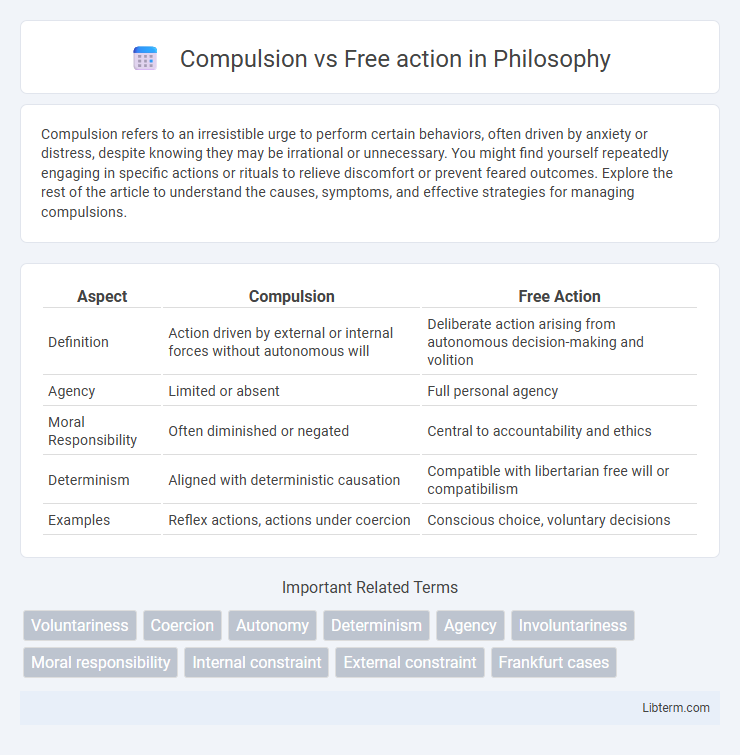Compulsion refers to an irresistible urge to perform certain behaviors, often driven by anxiety or distress, despite knowing they may be irrational or unnecessary. You might find yourself repeatedly engaging in specific actions or rituals to relieve discomfort or prevent feared outcomes. Explore the rest of the article to understand the causes, symptoms, and effective strategies for managing compulsions.
Table of Comparison
| Aspect | Compulsion | Free Action |
|---|---|---|
| Definition | Action driven by external or internal forces without autonomous will | Deliberate action arising from autonomous decision-making and volition |
| Agency | Limited or absent | Full personal agency |
| Moral Responsibility | Often diminished or negated | Central to accountability and ethics |
| Determinism | Aligned with deterministic causation | Compatible with libertarian free will or compatibilism |
| Examples | Reflex actions, actions under coercion | Conscious choice, voluntary decisions |
Understanding Compulsion: Definition and Examples
Compulsion refers to an irresistible urge to perform certain actions, often driven by internal pressures or external forces, limiting an individual's ability to choose freely. Examples include compulsive behaviors in obsessive-compulsive disorder (OCD), where repetitive actions like hand-washing are performed to relieve anxiety despite conscious resistance. Understanding compulsion involves recognizing the difference between involuntary responses and deliberate free actions, which is crucial in psychology and legal contexts.
Defining Free Action in Human Behavior
Free action in human behavior is defined by the capacity to make choices based on individual intentions, desires, and rational deliberation rather than external coercion or internal compulsion. It emphasizes autonomy, where actions stem from the agent's own volition and self-control, distinguishing voluntary behavior from acts compelled by necessity or constraint. The concept of free action is central to moral responsibility, as it underpins accountability for decisions made freely rather than under compulsion.
Psychological Roots of Compulsive Behavior
Compulsive behavior often originates from deep psychological roots such as anxiety, unresolved trauma, and obsessive fears, leading individuals to engage in repetitive actions as a coping mechanism. Neurobiological factors, including imbalances in neurotransmitters like serotonin and dopamine, also play a critical role in driving compulsions. Understanding the distinction between compulsion and free action requires exploring how these psychological and neurochemical influences restrict voluntary control and reinforce habitual responses.
Philosophical Perspectives on Free Will
Philosophical perspectives on free will often debate the tension between compulsion and free action, where compulsion implies actions determined by external forces or internal constraints, while free will suggests autonomous choice. Compatibilists argue that free action can coexist with determinism if the action aligns with the agent's desires and intentions, despite underlying causal influences. In contrast, libertarians emphasize indeterminism and genuine agent causation as essential for free will, rejecting any form of compulsion that negates true moral responsibility.
Key Differences Between Compulsion and Free Action
Compulsion involves actions driven by external pressures or internal urges that limit an individual's control, often resulting in behavior that is involuntary or automatic. Free action is characterized by intentional and voluntary decision-making, where an individual exercises autonomy and rational choice without coercion or constraints. The key difference lies in the presence of control and consent: compulsion reduces or eliminates freedom, while free action reflects self-governed behavior based on conscious deliberation.
The Role of Conscious Choice in Decision-Making
The role of conscious choice in decision-making highlights the distinction between compulsion and free action by emphasizing intentionality and awareness in selecting alternatives. Unlike compelled actions driven by external forces or subconscious impulses, free actions involve deliberate evaluation of options based on personal values and goals. Neuropsychological studies indicate that conscious choice activates prefrontal cortex regions, underscoring the cognitive mechanisms underlying autonomous behavior.
Neuroscience Insights: Brain Mechanisms of Compulsion and Free Action
Neuroscience research reveals that compulsion is linked to hyperactivity in the cortico-striatal-thalamo-cortical (CSTC) circuit, particularly involving the orbitofrontal cortex and the dorsal striatum, which drives repetitive, involuntary behaviors. In contrast, free action is associated with increased activity in the prefrontal cortex, especially the dorsolateral prefrontal cortex, facilitating conscious decision-making and voluntary control. Functional MRI studies demonstrate that disruptions in these networks can shift behavior from autonomous choice to compulsive patterns, highlighting the neural substrates differentiating free will from compulsion.
Ethical Implications: Responsibility and Accountability
Compulsion diminishes an individual's moral responsibility as actions driven by external forces limit autonomous choice, raising complex ethical questions about accountability. Free action entails deliberate decision-making, thereby establishing clear grounds for attributing responsibility and justifying praise or blame. Ethical frameworks often emphasize the importance of autonomy for holding agents accountable, as compelled behavior challenges traditional notions of justice and moral evaluation.
Compulsion in Mental Health Disorders
Compulsion in mental health disorders manifests as repetitive behaviors or mental acts driven by an irresistible urge, often performed to alleviate anxiety associated with obsessive thoughts. These compulsive actions, commonly seen in conditions like Obsessive-Compulsive Disorder (OCD), undermine free action by reducing an individual's ability to exercise voluntary control over their behaviors. Neurobiological studies link compulsions to dysfunctions in the cortico-striatal-thalamo-cortical (CSTC) circuit, highlighting the pathological basis of these involuntary acts.
Nurturing Free Action: Strategies for Empowerment
Nurturing free action involves fostering environments where individuals exercise autonomy and make informed decisions, countering the limiting effects of compulsion. Empowerment strategies include promoting critical thinking, providing access to resources, and encouraging self-reflection to enhance personal agency. Cultivating supportive communities and educational frameworks strengthens individuals' capacity to pursue authentic goals free from external coercion.
Compulsion Infographic

 libterm.com
libterm.com